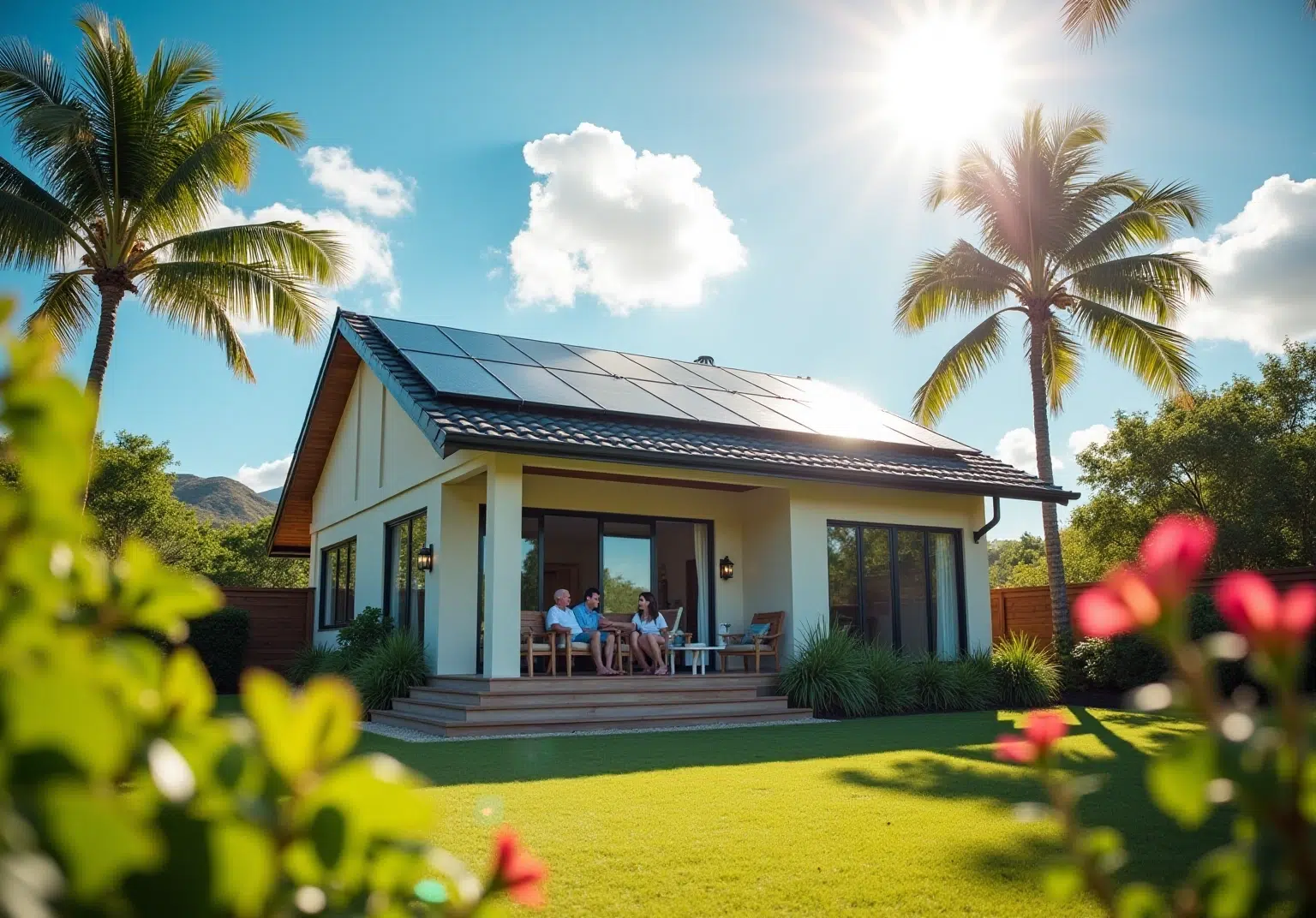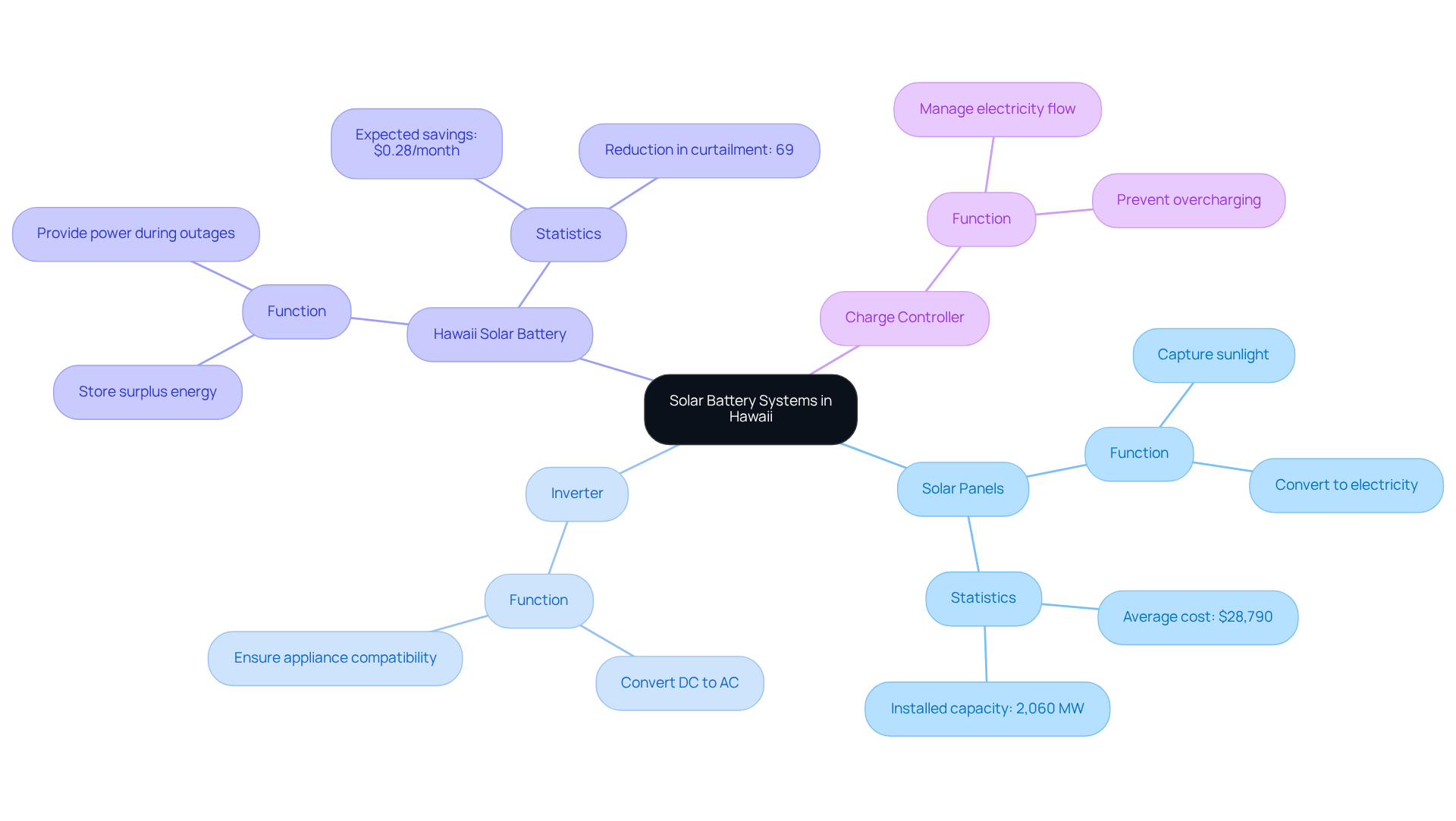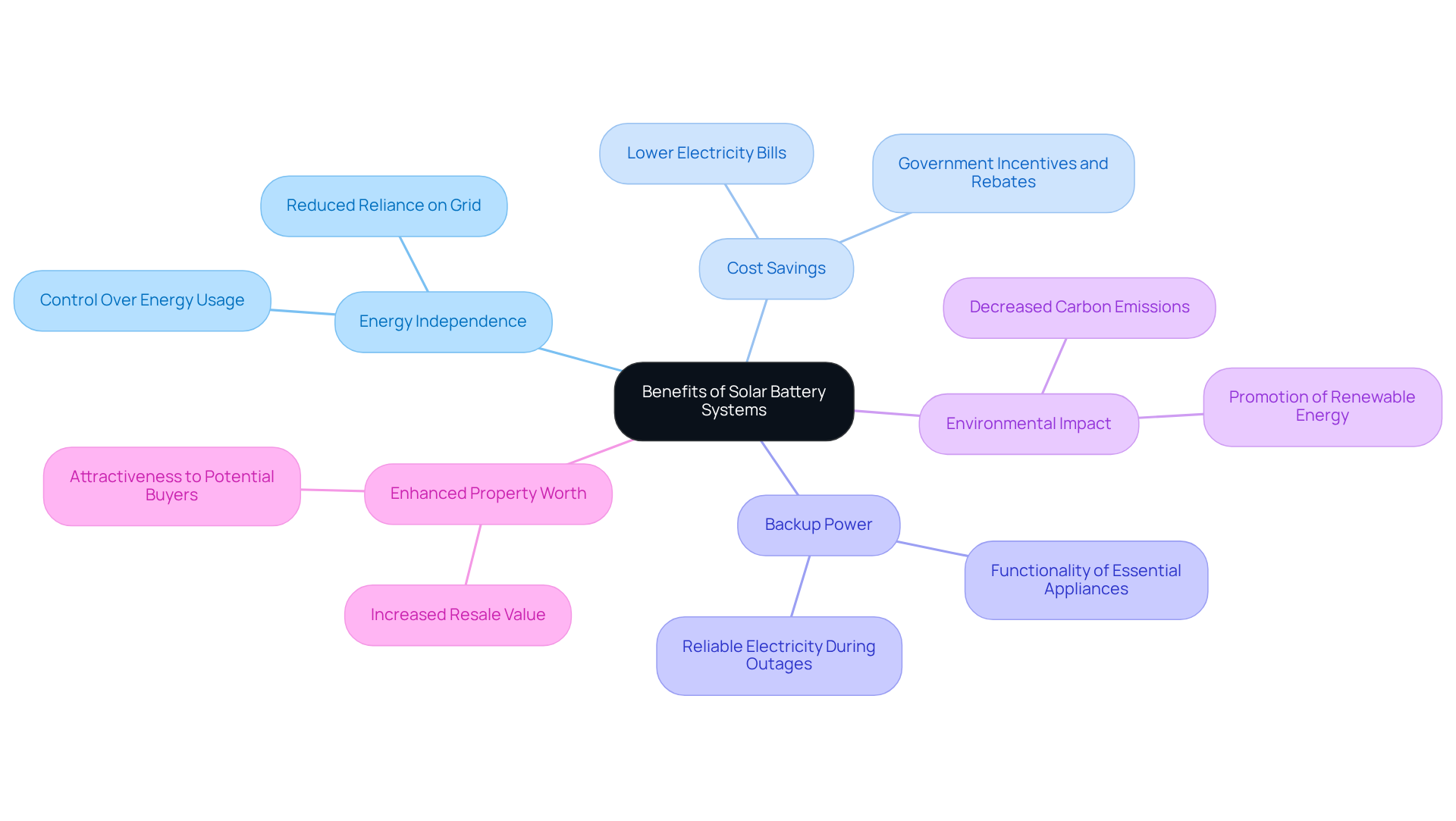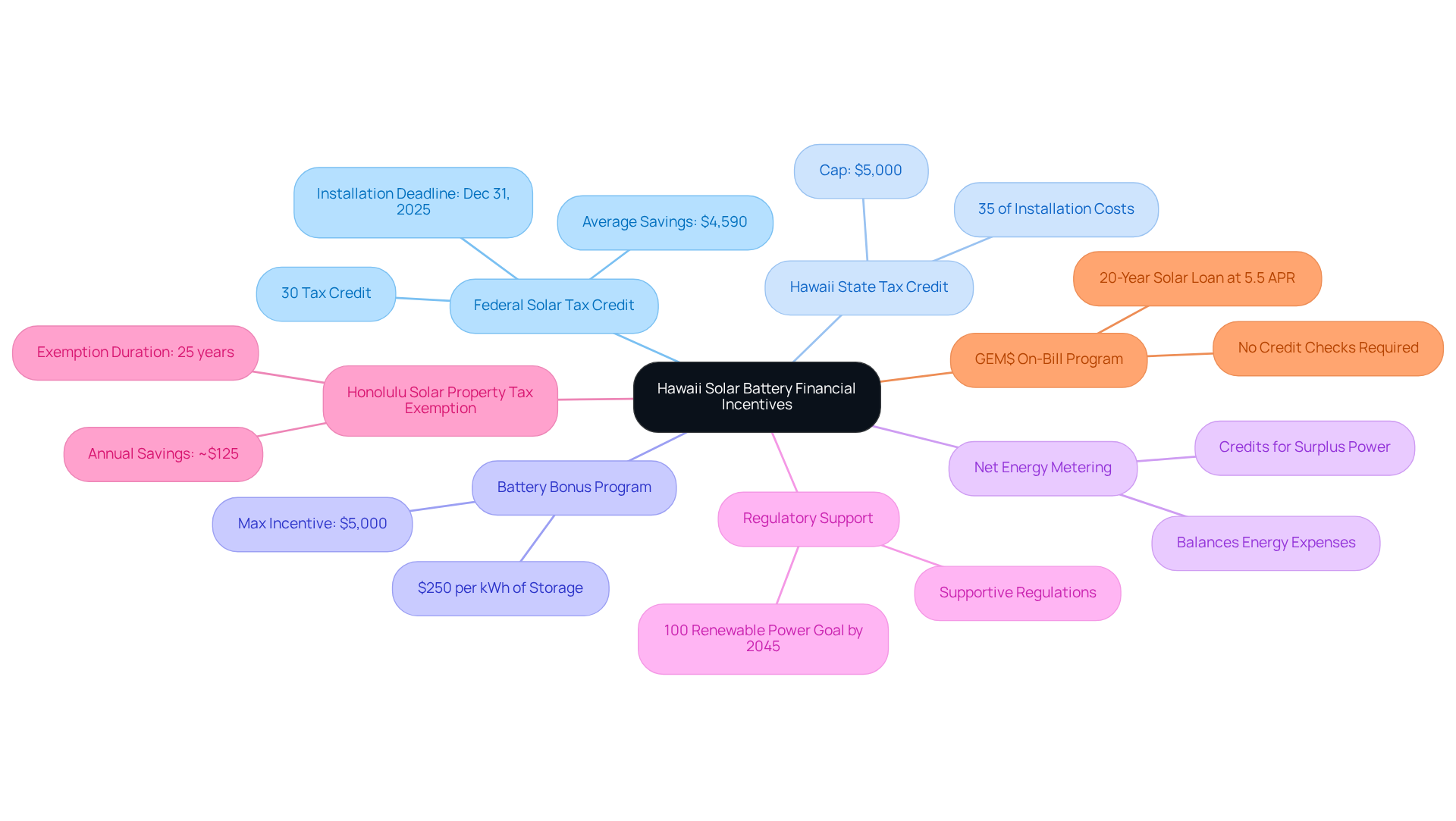Overview
We understand that rising energy bills can be a significant concern for homeowners. Hawaii solar batteries offer a meaningful solution, providing energy independence and cost savings while ensuring backup power during outages. These systems not only enhance energy management by storing surplus solar energy, but they also come with financial incentives and regulations that make installation more affordable.
Together, we can promote a sustainable energy future that benefits both you and the environment. By investing in solar batteries, you’re taking a step towards greater control over your energy usage and costs. Let’s work towards a brighter, more sustainable future together.
Introduction
Many homeowners in Hawaii are understandably grappling with soaring electricity bills, even amidst the stunning landscapes and abundant sunshine that make the islands ideal for harnessing solar energy.
Solar battery systems offer a transformative solution, allowing residents to store excess energy generated by their solar panels for later use. This not only leads to greater energy independence but also significant financial savings.
However, with various options and incentives available, it’s common to feel overwhelmed. How can homeowners navigate this complex landscape to maximize their benefits?
Exploring the essentials of solar battery systems in Hawaii reveals not only the technology’s advantages but also the financial incentives that can ease the transition to renewable energy. Together, we can work towards a more sustainable future.
Explore the Basics of Solar Battery Systems in Hawaii
Are you feeling overwhelmed by rising energy bills? In Hawaii, where the sun shines brightly, setups for Hawaii solar battery storage are designed to hold the surplus energy produced by photovoltaic panels for your future needs. These systems typically consist of:
- Solar Panels: Capture sunlight and convert it into electricity, helping you harness the power of nature.
- Inverter: Converts the direct current (DC) produced by solar panels into alternating current (AC) for home use, ensuring your appliances run smoothly.
- Hawaii Solar Battery: This system retains surplus power for use during non-sunny times, such as at night or during outages, providing you with peace of mind.
- Charge Controller: Manages the flow of electricity to and from the energy storage, preventing overcharging and ensuring optimal performance, so you can trust your system.
By investing in photovoltaic storage solutions, you can significantly enhance your power autonomy and reliability, especially during high demand periods or unexpected interruptions. Together, we can work towards a more sustainable and independent energy future. If you’re ready to explore how these systems can benefit you, let’s connect and discuss how we can support you on this journey.
Understand the Benefits of Solar Battery Systems for Homeowners
Homeowners in Hawaii often find themselves grappling with rising energy bills, and solar battery systems offer a compassionate solution that not only enhances energy management but also provides financial relief.
- Energy Independence: We understand that reducing reliance on the grid is a priority, especially during peak hours when electricity rates can be overwhelming. By storing solar energy, a household using 30 kWh daily would benefit from a battery with at least a 10 kWh capacity, effectively covering one-third of its consumption. This empowers you to take control over your energy usage and costs.
- Cost Savings: Imagine the relief of drawing from your own power reserves instead of purchasing electricity from the utility. This shift can lead to significant reductions in your electricity bills. Additionally, many administrations and utility providers offer incentives and rebates for installing energy storage systems, making the transition even more affordable.
- Backup Power: It’s common to feel anxious about power failures, but photovoltaic batteries provide a reliable source of electricity during such times, ensuring that essential appliances remain functional. This capability is vital for maintaining comfort and safety during unexpected disruptions.
- Environmental Impact: By maximizing renewable resources, you play a crucial role in decreasing carbon emissions, promoting sustainability, and fostering a cleaner environment. Utilizing stored sunlight not only lessens reliance on fossil fuels but also contributes to broader efforts to combat climate change.
- Enhanced Property Worth: Homes equipped with photovoltaic energy storage solutions often see an increase in property value. Potential buyers are drawn to the long-term savings and autonomy these systems provide, making such homes more attractive in the real estate market. As one homeowner shared, “Since setting up our energy storage solution, our electricity expenses have decreased considerably, and we feel more secure during power interruptions.”
Together, we can explore how solar battery systems can transform your energy experience, providing not just savings but peace of mind. Let’s work towards a sustainable future that benefits you and the environment.
Review Financial Incentives and Regulations for Solar Battery Systems in Hawaii
Are you feeling overwhelmed by rising energy bills? You’re not alone. Many homeowners share this concern, and that’s where Hawaii solar battery financial incentives and regulations come into play, offering a path toward more affordable energy solutions.
-
Federal Solar Tax Credit: Homeowners can benefit from a generous 30% tax credit on installation costs for solar energy systems, including battery storage, as long as the systems are installed by December 31, 2025. This significant incentive can lead to substantial savings, averaging around $4,590 on federal taxes for eligible homeowners.
-
Hawaii State Tax Credit: The Renewable Energy Technologies Income Tax Credit (RETITC) allows you to claim 35% of your installation costs, capped at $5,000. This state-level incentive greatly enhances the affordability of Hawaii solar battery storage solutions, making renewable power more attainable for you and your family.
-
Battery Bonus Program: This initiative provides cash incentives of $250 per kilowatt-hour (kWh) of storage capacity for homeowners who install Hawaii solar battery storage systems, further decreasing the overall investment required for solar technology. You could receive as much as $5,000 for residential installations, promoting the adoption of these valuable storage solutions.
-
Net Energy Metering (NEM): While NEM has evolved, it continues to offer credits for surplus power sent back into the grid. This arrangement helps balance expenses, making photovoltaic installations even more economically feasible for you.
-
Regulatory Support: Hawaii’s commitment to achieving 100% renewable power by 2045 creates a supportive environment for photovoltaic and battery setups. The state’s regulations, including those from the Hawaii State Energy Office and Hawaiian Electric, are designed to encourage investment in photovoltaic technology, ensuring you can benefit from a sustainable power future.
-
Honolulu Solar Property Tax Exemption: This exemption allows you to save approximately $125 annually on property taxes for photovoltaic panel installations, lightening your financial load.
-
GEM$ On-Bill Program: This program provides financing options for homeowners and renters in Hawaii to acquire photovoltaic panel installations without credit assessments or income verification, making renewable power more accessible to everyone.
These incentives and regulations not only lower the initial expenses of Hawaii solar battery installations but also promote long-term savings and self-sufficiency for homeowners. For instance, a 5 kW solar system can save homeowners approximately $137,835 over 25 years, showcasing the financial benefits of investing in solar energy. Together, we can create a brighter, more sustainable future for our homes and our planet.
Conclusion
Investing in solar battery systems in Hawaii offers a transformative opportunity for homeowners who are looking to regain control over their energy expenses and enhance their overall energy independence. We understand that rising energy bills can be a source of stress, and by harnessing the power of the sun and utilizing storage solutions, you can reduce your reliance on the grid while taking significant steps toward a sustainable future.
Throughout this discussion, we’ve highlighted the critical components of solar battery systems, including:
- Solar panels
- Inverters
- Charge controllers
These components work together to optimize your energy usage. The numerous benefits—energy independence, cost savings, reliable backup power, and a positive environmental impact—underscore the importance of these systems in addressing the challenges posed by rising energy costs and contributing to a greener planet. Furthermore, the financial incentives and supportive regulations available in Hawaii make the transition to solar energy more accessible and financially viable than ever before.
As you consider your energy options, embracing solar battery systems is not just a practical choice; it’s a pivotal step toward a more sustainable lifestyle. By capitalizing on the available incentives and investing in renewable energy solutions, you can significantly improve your energy management while contributing to a cleaner environment. The time to act is now—let’s explore the possibilities of solar energy storage together and join the movement toward a more sustainable future for Hawaii.





